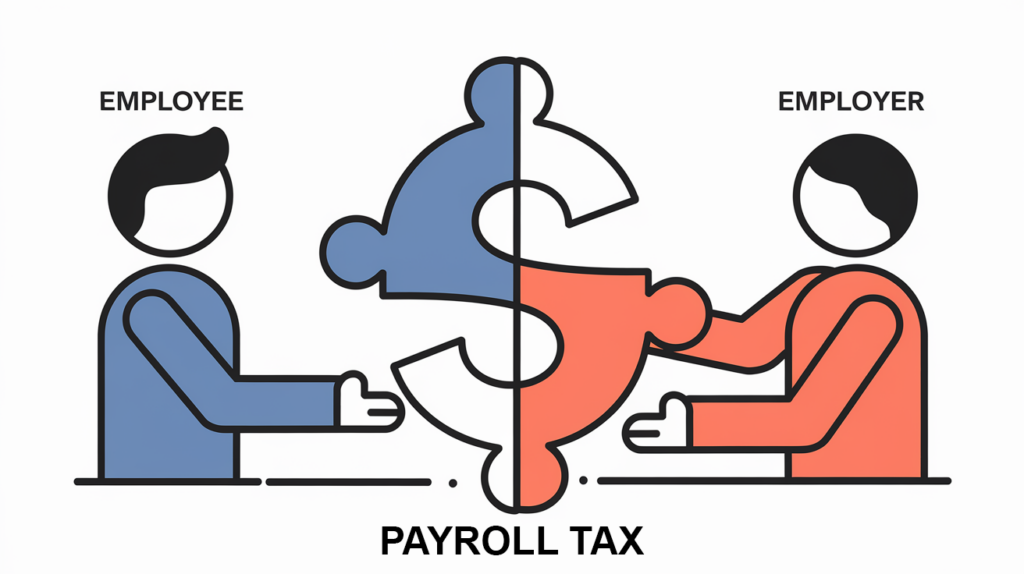Payroll tax refers to the taxes deducted from employees’ wages and paid to the government by employers. These taxes primarily fund social insurance programs such as Social Security and Medicare, as well as unemployment insurance and various local services.
Key Takeaways
- All employees have a portion of their pay sent to the government in the form of payroll taxes.
- Payroll taxes in the United States finance programs like Social Security and Medicare.
- Both employers and employees have to pay an equivalent share of Social Security and Medicare taxes.
- Payroll taxes help fund everything from federal and state programs to healthcare and local infrastructure.
Understanding Payroll Taxes
In the United States, the Federal Insurance Contributions Act (FICA) tax covers both Social Security and Medicare obligations. Paychecks will list these deductions as both MedFICA and FICA. The U.S. Treasury receives the federal income tax that is deducted from workers’ paychecks. Income taxes are also collected at the state and local levels by most states and by some towns and counties.
In addition, federal unemployment taxes for each worker are covered by employers, not workers. Payroll taxes are collected by the federal government and sometimes by individual states in several nations, including the United States. A worker’s pay stub will detail all of the payroll taxes withheld from their paycheck. Taxes at the federal, state, and local levels, as well as Medicare and Social Security contributions, are all accounted for in detail.
Payroll taxes are used by governments to finance essential services such as Social Security, healthcare, and workers’ compensation. A tiny payroll tax could be used by municipalities to fund essential services like police protection, road repairs, and park upkeep.
Read more: Payroll Tax Definition | What are Payroll Taxes?

Federal Payroll Tax Rates
The federal payroll tax rate is typically around 15.3%, with the employee covering 7.65% and the employer covering 7.65%. If you are self-employed—as a sole proprietor or firm owner—you must pay the full 15.3%, often known as self-employment tax. Additional taxes and credits based on your circumstances may vary what your company is obligated to pay.
Employers and employees both pay federal employment taxes, which fund Social Security, Medicare, and unemployment insurance. Social Security and Medicare taxes are referred to as FICA taxes (and may appear on paycheck stubs) since they were included in the 1930s New Deal legislation that established Social Security. The Federal Unemployment Tax Act of 1939, which established the benefit, is known as the FUTA tax.
Rates have risen over time, while they have remained relatively stable since 1992. The following are the federal payroll tax rates for 2023:
- Social Security tax rate: 6.2% for the employee plus 6.2% for the employer
- Medicare tax rate: 1.45% for the employee plus 1.45% for the employer
- Additional Medicare: 0.9% for the employee when wages exceed $200,000 in a year
- FUTA tax rate: 6% for the employer on the first $7,000 paid to the employee
When your company files its tax return each year, it will include a form indicating that it paid state unemployment taxes, which can qualify you for a tax credit in most situations. The credit has the potential to reduce the FUTA tax rate to as low as 0.6%. Learn more about the FUTA tax from the IRS, and work with a skilled tax preparer to file the necessary paperwork.

State Payroll Taxes
In addition to federal taxes, you may be required to pay state payroll taxes. The most prevalent state payroll tax pays for state unemployment insurance (SUTA tax), which you cover 100% as the employer. Unemployment insurance is paid based on what tax agencies refer to as a wage base, which is a cap on the wages taxable to a specific tax.
The minimum wage and tax rates differ by state. To find out what your rates are, contact your state’s Department of Workforce Development or another entity that oversees unemployment insurance. Depending on your state’s procedures, you may pay state unemployment taxes alongside payroll or as a separate payment each month or quarter.
Some states collect additional payroll taxes to fund services like workforce development, disability insurance, and public transportation. Consult an accountant in your state to learn which taxes your company must pay or deduct from payroll.
Tax Amounts
Paying into Social Security and Medicare during your working years earns you a right to benefits at retirement or in the event of certain medical emergencies. Employee contributions to Medicare and Social Security total 7.65% (1.45% for Medicare and 6.2% for Social Security). The 7.65% tax paid by an employee is matched by the employer, bringing the total to 15.3%.
There is a maximum income at which no further Social Security tax is withheld. The U.S. FICA payroll tax is regressive because it only applies to those with incomes below $147,000 in 2022 and $160,200 in 2023. While there is no upper limit on income, those with incomes over $200,000 will be required to pay an additional 0.9% into the Medicare system.
While there is no cap on Medicare taxes, meaning the standard 2.9% Medicare tax applies to all wage and salary income without any upper limit, Social Security contributions are capped at specific income levels each year.

Unemployment Taxes
The bulk of the cost for unemployment benefits must come from employer contributions. Employers must provide unemployment benefits to those who are laid off. The employer’s share of unemployment insurance costs is determined by the employer’s location, the state, and the federal government.
Unemployment and disability insurance premiums are obligatory in some states.
Self-Employment Taxes
Payroll taxes, often known as self-employment taxes, are required to be paid by independent professionals like contractors, freelance writers, musicians, and small business owners. Self-employed individuals, in contrast to most wage earners, do not have payroll taxes withheld by their employers. As a result, they are responsible for footing the bill for both the employer and employee halves of the tax.
Included in the 15.3 percent tax rate for those who work for themselves is a 12.4 percent payment to Social Security, which covers retirement, survivors, and disability. Medicare receives 2.9%, while those with earnings over $200,000 pay an additional 0.9% Medicare surtax.
Read more: Employment Taxes
Payroll Taxes vs. Income Taxes
Payroll taxes are distinct from income taxes despite both being deducted from a worker’s paycheck. Payroll taxes support specific government initiatives such as Social Security and Medicare, whereas federal income taxes are deposited into the Treasury’s general fund. There is a yearly limit on how much in payroll taxes someone will have to pay, whereas income taxes are progressive, meaning a person’s rate changes depending on their income level. State income tax, if any, goes into the state’s treasury.
What Makes Up Payroll Taxes?
All of an employee’s income tax obligations are rolled into a single lump sum known as payroll taxes. These include Social Security, Medicare, unemployment insurance, government services, and local infrastructure funding.
Does Everyone Pay a Payroll Tax?
Payroll taxes are mandatory and are typically withheld from every paycheck. While income tax is progressive (i.e., those with greater incomes pay a higher rate), Social Security and Medicare taxes are regressive (i.e., everyone pays the same amount).
The Bottom Line
Wages, tips, and salaries are subject to payroll taxes, which are covered by both the employee and the company. All applicable taxes, including federal, state, and municipal levies and FICA contributions to Social Security and Medicare, are included here. All of these deductions are subtracted from a worker’s pay.
All sorts of things get paid for with these taxes, from Social Security and healthcare to military and government salaries and workers’ compensation. A tiny payroll tax could be used by municipalities to fund essential services like police protection, road repairs, and park upkeep.
People Also Read:
Frequently Asked Questions
Why Are Workers Less Sensitive to Payroll Taxes Compared to Employers?
Workers are generally less sensitive to payroll taxes because they have limited flexibility to adjust their income. Employees rely on their wages for essential needs and cannot easily reduce work hours or seek alternative employment. In contrast, employers can adjust their hiring strategies, seek more cost-effective talent, or relocate operations to regions with lower tax burdens, making them more sensitive to payroll tax changes.
How Does the Concept of Tax Incidence Affect Payroll Taxes?
Tax incidence refers to who ultimately bears the burden of a tax. In the case of payroll taxes, although both employers and employees are legally responsible for paying the tax, economic dynamics often result in employees shouldering most of the burden. This is because employees are less sensitive to wage changes compared to employers, who can adjust their labor costs more easily.
How Significant Are Payroll Taxes in Terms of Government Revenue?
Payroll taxes are a significant source of government revenue, accounting for nearly 25% of combined federal, state, and local government revenue. They play a crucial role in funding essential social programs like Social Security and Medicare, making them a key pillar of public finances.
How Do Payroll Taxes Impact Employee Wages?
Payroll taxes impact employee wages by reducing their take-home pay. Additionally, employees indirectly bear a portion of the employer’s payroll tax through lower wages. This occurs because employers may lower wages to offset their tax obligations, effectively shifting some of the tax burden onto employees.
Who Ultimately Bears the Burden of Payroll Taxes, Employers or Employees?
While employers and employees are both legally required to pay payroll taxes, employees ultimately bear the majority of the burden. This is due to the relative inelasticity of labor supply compared to labor demand, meaning employees are less able to negotiate higher wages to compensate for the tax, while employers can adjust wages or hiring practices to manage their tax liabilities.
Are There Caps on Payroll Taxes for Social Security and Medicare?
Yes, there are caps on payroll taxes for Social Security but not for Medicare. For Social Security, there is a maximum income limit ($147,000 in 2022 and $160,200 in 2023) beyond which no further Social Security tax is withheld. However, Medicare taxes have no upper limit, and high earners pay an additional 0.9% Medicare surtax on incomes exceeding $200,000.








 anywhere
anywhere  anytime
anytime